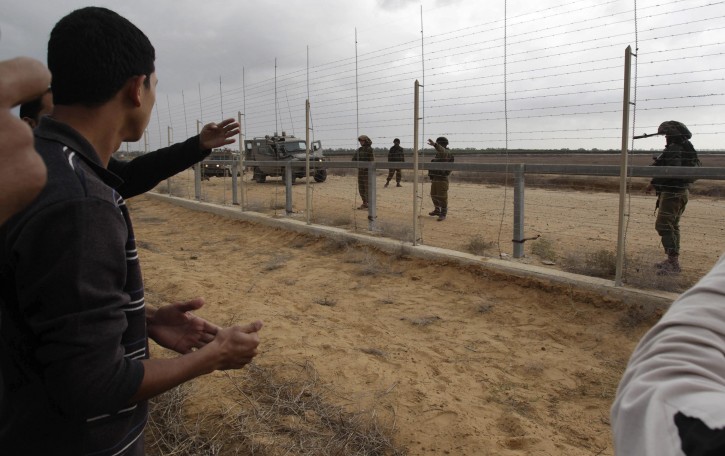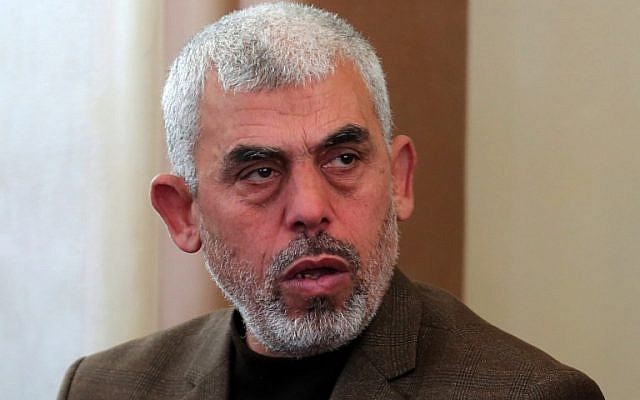Hamas admits it can’t govern Gaza

Palestinian youth throw stones at Israeli soldiers stationed along the border fence. Hamas demands that Israel lift the siege and barriers while it continues to declare war on Israel. Photo by Reuters from www.vosizneias.com/
Why Hamas is offering Abbas Gaza on a silver platter
Hamas’ leader in Gaza, Yahya Sinwar, admits that the movement has failed at managing the Gaza Strip.
By Shlomi Eldar, Al Monitor
December 22, 2017
For more than a decade, the leaders of Fatah hoped to hear the kind of announcement that Hamas Gaza leader Yahya Sinwar made on Dec. 20. At a meeting with representatives of the various civil defence organizations in the Gaza Strip, Sinwar declared that his movement had made a strategic decision not to govern or administer the Gaza Strip anymore. Sinwar noted that the division among the Palestinian people “harmed all of us as a people and as a liberation movement,” and he even admitted what no one before him dared to say. The split with the Palestinian Authority (PA) hurt Hamas as a resistance movement.
A Fatah source in Gaza told Al-Monitor that Sinwar’s remarks came as a surprise to the PA. He pointed out that the general impression is that Sinwar did not make the statement only to push forward with the Palestinian reconciliation agreement. The remarks emerged also from a deep realization that the Hamas leadership cannot have it both ways.

Hamas leader Yahya Sinwar attends the opening of a new mosque in Rafah in the southern Gaza Strip on February 24, 2017. Photo by Said Khatib/AFP
Ever since the PA was thrown out of Gaza in disgrace in 2007 during the coup orchestrated by Hamas’ military wing, Fatah’s leaders were convinced that the rival movement would come begging the PA to take back the reins of power. In fact, this was the very strategy taken by Palestinian President Mahmoud Abbas when he decided to follow the advice of his closest advisers and disengage from Gaza. They argued that economic pressure would force Hamas to realize that they can’t play a double game. They cannot fight against Israel while at the same time demanding that it allow the transfer of goods and raw materials.
It took over a decade for the leaders of Hamas to recognize the inherent contradiction in their actions and admit that they had made a fatal mistake that not only cost thousands of Palestinian lives, but also brought the Gaza Strip to economic ruin. Many Gaza residents are now dependent on support from the United Nations Relief and Works Agency for Palestine just to survive. It is what saves them from starvation.
Today, over a decade after the coup — a period that seems like an eternity to the people of Gaza — Sinwar admits wholeheartedly: We made a mistake. We lack the ability and means to govern almost 2 million people, and in our arrogance we cast them into a state of indigence, hunger and desperation.
Three important points should be noted about Sinwar’s statement:
The leaders of Hamas and its institutions, including the Shura Council, regard the decision to give up control of the government in Gaza as a strategic move. As such, the movement’s political wing, but also its military wing, will have to fall into line.
So far, Hamas has been forced to compromise on what it considers core principles in order to continue ruling in Gaza. This was evident in the past few days when Ismail Haniyeh called for a new intifada. At the same time, the movement’s military wing stopped Salafist activists from firing rockets at Israel, since that would get Hamas “into trouble.” Activities such as this have caused other groups in Gaza to argue defiantly that Hamas has lost its way.
The failed government of Gaza will have implications for Hamas’ aspirations in the West Bank and the moves it makes to achieve those goals. If Hamas failed in Gaza, why should it aspire to “conquer” the West Bank, where the geographic and civil situation is far more complicated than in Gaza?
Sinwar’s dramatic but honest remarks were directed at Abbas. He called on him to derive the right conclusions from President Donald Trump’s Dec. 6 Jerusalem declaration and to move ahead with reconciliation. On Dec. 21, the day after his statement of failure, Sinwar released a statement to the press in which he made a frank admission: “Whoever doesn’t see that reconciliation is collapsing is blind.” Actually, only a blind person could not see the obstacles that both sides would have to overcome before they start celebrating their reconciliation.
From the moment they signed the reconciliation agreement, control over the security forces in Gaza has been the core argument between the two parties. As far as Hamas is concerned, giving up the military wing is akin to surrender and suicide. As far as Abbas is concerned, this condition is non-negotiable.
Do Sinwar and the other Hamas leaders believe they will be able to convince Abbas to move forward with the reconciliation despite this dispute? It seems that way. A source in Hamas told Al-Monitor that when it comes to the military and security forces operating in Gaza, Hamas told the PA that it would be impossible to do anything overnight and that it would have to happen gradually. In other words, they would have to reach an agreement that the split is over and that the PA and its president are running civilian affairs in Gaza, while building the trust to establish a single Palestinian army subject to the president’s orders.
The idea that Hamas is toying with now is that the Palestinian police forces responsible for internal security in the Gaza Strip would come under the command of the PA, while Hamas would continue to keep its Izz ad-Din al-Qassam Brigades as a separate organization. Just as Fatah has its Tanzim faction and Palestinian Islamic Jihad has its Al-Quds Brigades, Hamas would continue to have its own military wing as a “weapon of resistance.”
This brings us right back to where we started. It is doubtful that Abbas will be ready to accept the ungenerous proposals offered by Hamas. On the other hand, Fatah can regard Sinwar’s statement as an achievement and tell Hamas, “We told you so.”
Shlomi Eldar is a columnist for Al-Monitor’s Israel Pulse. For the past two decades, he has covered the Palestinian Authority and especially the Gaza Strip for Israel’s Channels 1 and 10, reporting on the emergence of Hamas. In 2007, he was awarded the Sokolov Prize, Israel’s most important media award, for this work. On Twitter: @shlomieldar
